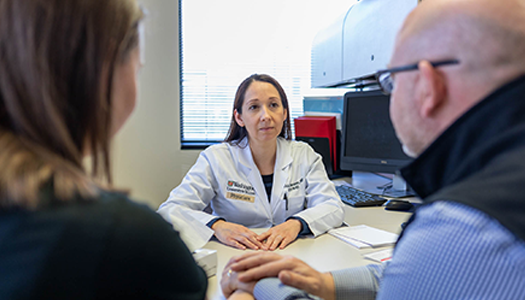After the excitement of finding out you’re pregnant, having it end in miscarriage is discouraging and emotionally challenging. It’s important to remember that having miscarriages doesn’t mean you won’t be able to have a successful pregnancy and live birth.
The experts at the Fertility & Reproductive Medicine Center identify and treat many underlying causes of recurrent miscarriage to help you achieve your goal of becoming a parent.

Understanding Miscarriage
Sadly, miscarriage is a very common occurrence, affecting as many as half of all pregnancies. Most of these losses occur during the first trimester (13 weeks or earlier), sometimes before a woman knows she is pregnant.
Recurrent pregnancy losses (two or more miscarriages in a row) can be especially devastating. But even after two miscarriages, there’s a 65 percent chance that your third pregnancy will result in a live birth.
Early miscarriages occur during the first trimester. This is the most common type of miscarriage and usually results from chromosomal abnormalities with the embryo.
Late miscarriages occur during the second or third trimester. This type of miscarriage may result from uterine abnormalities, autoimmune problems, or other, less common problems.
Diagnosing and Treating Recurrent Miscarriage
At the Fertility & Reproductive Medicine Center, we offer the latest diagnostic testing to help determine the cause of recurrent pregnancy loss. With a confirmed diagnosis, we can develop a treatment plan to address the cause and help you carry your next pregnancy to term.
Our fertility specialists perform various tests to identify causes of recurrent miscarriage and determine the best treatment. Potential causes of miscarriage include:
- Genetic abnormalities: Our specialists can test you and your partner to see if either of you might be passing on a specific genetic abnormality that may increase your risk of recurrent miscarriages. If you opt to pursue in vitro fertilization (IVF), we can perform preimplantation genetic testing on your embryos. This test helps us select a chromosomally normal embryo that, in some cases, may increase the chances of a live birth.
- Uterine abnormalities: Structural problems with the uterus, such as uterine abnormalities, fibroids, polyps or uterine scarring, can all cause miscarriage. Our skilled reproductive surgeons have years of experience treating these conditions with surgery before you try to become pregnant.
- Endocrine conditions: Diseases of the thyroid or pituitary gland or uncontrolled diabetes can cause recurrent miscarriage. Our expert reproductive endocrinologists can diagnose and treat women with these conditions to help them successfully carry a pregnancy to term.
- Autoimmune diseases: Some women produce antibodies that can cause clotting in the vessels supplying blood to the unborn baby. Without an adequate blood supply, the unborn baby doesn’t receive enough nutrients and dies in utero, causing a miscarriage. If blood tests confirm this condition, we can prescribe medicines that may help you sustain your pregnancy.
- Environmental and lifestyle factors: Exposure to certain chemicals or drugs may increase your risk of miscarriage. Our physicians can help you understand any risk factors that may exist in your home or work environment. They will also advise you on how lifestyle changes – such as quitting smoking, losing weight or cutting back on caffeine or alcohol – can help reduce your risk for miscarriage.
Contact Us
To make an appointment with a Washington University fertility and reproductive medicine specialist at the Women and Infants Center, call 888.998.5497.